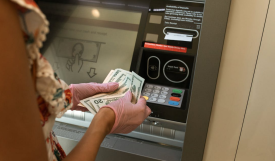Undocumented Millennials Share Their Political and Personal Views in Nationwide Survey
Less than half of undocumented youth living in the United States identify with the Democratic Party, while most of the others claim loyalty to independent parties or nonparty affiliations, according to a new study published earlier this week.
Nonetheless, even with partial Democratic allegiance, undocumented youth overall expressed skepticism of both political parties — with more dissatisfaction with the Republican Party; their political views are greatly influenced by Washington DC's sluggish efforts to provide a path toward citizenship.
The nationwide survey revealed that 4 in 10 felt closer to the Democratic Party, while a mere 5 percent felt closer to the Republican Party. Yet, 4 in 10 young immigrants said that they would not support Democrats "as long as immigration reform is not passed." While none are able to vote because they aren't citizens, they are affected by the political actions and votes of Latinos who do vote. And, the Dreamer group is a politically active one — 40 percent attend demonstrations and rallies, compared to 6 percent of other Americans. Approximately half of Dreamers indicated that they participated in voter mobilization efforts during the 2012 elections, and nearly 75 percent stated their support for the re-election of President Obama. About the same percentage of immigrant youth and Latino voters stated they would be swayed toward Democratic support in the future depending on whether the party "addressed the issue of separation of families because of deportation."
Young immigrants are also preparing to renew their deportation deferrals, according to the report. Valid for two years, the temporary documents include social security numbers and work permits. When applying, 9 in 10 of the respondents received deferrals, and as a result, a majority of the youth said that their finances had improved, they'd found their first jobs, or they'd moved to a better job. The sense of security, well-being, and belonging becomes apparent among those who are able to defer deportation, but 72 percent believe that DACA benefits simply aren't enough.
The report showed that family income for these Latino millennials is low, with three-quarters reporting less than $25,000, and only about 20 percent are able to meet their monthly financial needs. DACA's $465 bi-annual, recurring fees impose a significant burden, and more than half indicated that they've required assistance from others to maintain their temporary status. Assistance, either legal or financial, is often needed; and while there are free DACA workshops or clinics, they aren't always accessible. Additionally, the report revealed that coming out as LGBTQ while undocumented is a struggle. Only 35 percent admitted to coming out as undocumented and LGBTQ; and a mere 14 percent had come out as LGBTQ. Eighteen percent remain closeted about their undocumented status and about being LGBTQ.
In Their Own Words: A National Survey of Undocumented Millennials, a report by Tom K. Wong, PhD, an assistant professor at UC San Diego, and Carolina Valdivia, a PhD student at Harvard University, is a survey that offers new insight into the largely uninvestigated "Dreamers" or Deferred Action for Childhood Arrivals (DACA) faction of the undocumented community. With 3,139 responses nationwide, nearly half of that from undocumented youth (1,472), the authors of the research stated that it is one of the largest surveys to-date on any segment of the undocumented population in the U.S. The survey asked questions about life after DACA, political incorporation, and the experience of "coming out' as undocumented and LGBQT.
Facebook advertisements were used to draw responses for the survey. Hailing from 42 states and the District of Columbia, the survey included people born in 60 countries, though 9 in 10 were Latino and nearly three-quarters were from Mexico. Three-quarters of those surveyed indicated that their education level was "some college or more," and more than two-thirds said that their education had been delayed due to their undocumented status.
Subscribe to Latin Post!
Sign up for our free newsletter for the Latest coverage!
© 2025 Latin Post. All rights reserved. Do not reproduce without permission.















